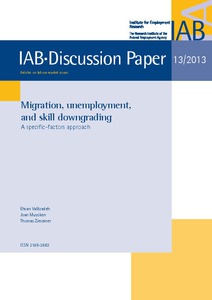Migration, unemployment and skill downgrading
"This paper analyzes the impact of the skill composition of migration flows on the host country's labor market in a specific factors two-sector model with heterogeneous labor (low-, medium-, and highly-skilled) and price- and wage-setting behavior. The low- and medium-skilled labor markets...
| Main Authors: | , , |
|---|---|
| Institution: | ETUI-European Trade Union Institute |
| Format: | TEXT |
| Language: | English |
| Published: |
Nürnberg
2013
IAB |
| Subjects: | |
| Online Access: | https://www.labourline.org/KENTIKA-19124352124919425349-Migration,-unemployment-and-sk.htm |
| Summary: | "This paper analyzes the impact of the skill composition of migration flows on the host country's labor market in a specific factors two-sector model with heterogeneous labor (low-, medium-, and highly-skilled) and price- and wage-setting behavior. The low- and medium-skilled labor markets are characterized by frictions due to wage bargaining. Moreover, we assume skill downgrading of unemployed medium-skilled workers into low-skilled labor supply. Endogenous benefits create an interdependency between the two bargaining processes. Particular attention is paid to medium-skilled migration, which enables us to contribute to the literature by replicating important stylized facts regarding medium skills, such as i) the interaction between immigration, low-skilled unemployment, and medium skill downgrading, ii) the increase in low skill intensive service jobs. The model is calibrated using data for Germany. The key findings are: (i) a migration-induced supply shock of medium skilled workers decreases the low-skilled unemployment rate under endogenous benefits; (ii) migration of only medium skilled labor has a neutral impact on GDP per capita; (iii) immigration of medium skilled labor together with some high skilled labor has a positive effect on output per capita." |
|---|---|
| Physical Description: | 41 p. Digital |

